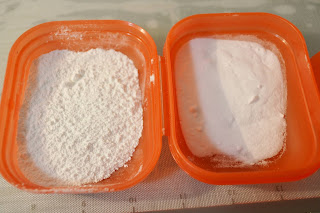Baking Basics: Difference Between Baking Soda and Baking Powder
Let's start with baking soda. Baking soda is a single chemical. It's called sodium bicarbonate, which is a base. If you don't remember what that means, it's basically the opposite of an acid, which means it will react with acids. Baking soda is called for in recipes when there is also an acid in the recipe somewhere. Examples of acids are: lemon juice, citric acid, cream of tartar, vinegar, buttermilk, molasses or even brown sugar. Baking soda makes the batter or dough swell up by reacting to the acid in the recipe.
Now let's look at baking powder. Baking powder typically contains three ingredients: a base such as sodium bicarbonate or sodium biphosphate, an acid such as cream of tartar, and corn starch. Because baking powder contains both an acid and a base, it does not require an acid in the recipe somewhere. Thus, baking powder is more typically used. Baking powder is activated simply by hydrating it. When it gets wet, both the acid and the base in the mixture mix together and react.
So, although they are similar in some ways, they're quite different in others. Now let's look at the age-old question: can you substitute one for the other? Yes, but only if you're careful with the recipe you're working with. For example, you can substitute baking powder instead of baking soda, but you're going to need about four times the amount and you should leave out the acid in the recipe. (Substitute regular milk for buttermilk, leave out the lemon juice, etc.) You can substitute baking soda instead of baking powder, but you're only going to need a quarter as much and you should add some kind of acid to create the reaction. (Add a bit of lemon juice or cream of tartar or buttermilk instead of regular milk, etc.) These substitutions can and will change the taste of your recipe, which may not be what you want.
So, my recommendation is to stick with whichever one is called for.
Now, both baking powder and baking soda can go bad and stop reacting over time. It's a good idea to test it. You can test your baking powder by mixing a bit of baking powder with some water.
You may not get a dramatic reaction, but there should be some fizzing and foam in the water. If there's no reaction, it's time to get rid of your baking powder and buy a new package.
In order to test your baking soda, you'll need an acid, like vinegar.
You won't need much of either to get a reaction.
And the reaction should be fairly dramatic. It should immediately start to foam and fizz. If it doesn't, then it's time to get rid of your baking soda and buy a new package.
I hope this information is helpful for you.
Watch us talk about it on our YouTube channel here: https://youtu.be/bJKhnyFxtSI
Schaut zu wie wir es erklären auf unserem YouTube Kanal hier: https://youtu.be/rijsRuXZfzc















I had wondered about the difference for years....this was very helpful and clear. Thank you so much!
ReplyDeleteThank you for the great feedback!
Delete